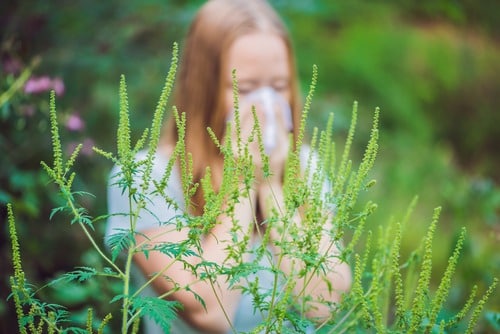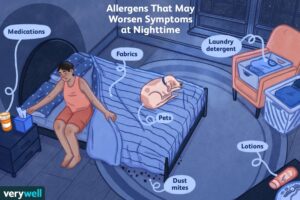
Introduction:
Pollen allergies are quite common and can be triggered by various types of pollens, including weed pollens. Weed pollen allergy is a common condition that affects people all around the world. It is caused by the release of pollen from different types of weeds such as ragweed, sagebrush, and pigweed. When the pollen comes in contact with the body, it triggers an allergic reaction that can result in various symptoms. This article will provide an overview of weed pollen allergy, its causes, symptoms, diagnosis, treatment, and prevention.
Weed pollen allergy treatment:

There are various treatment options for weed pollen allergy, depending on the severity of the symptoms. Some of the common treatments include antihistamines, decongestants, immunotherapy, and corticosteroids.
Weed pollen allergy symptoms:
The symptoms of weed pollen allergy can range from mild to severe and may include sneezing, runny or stuffy nose, watery or itchy eyes, itchy throat, coughing, headache, fatigue, difficulty breathing, and asthma.
Weed pollen allergy foods to avoid:
Some foods can cross-react with weed pollen, causing an allergic reaction. Foods to avoid if you have weed pollen allergy may include melons, bananas, cucumber, zucchini, sunflower seeds, and chamomile tea.
Plants causing pollen allergy is:
Weed pollen allergy can be triggered by various types of weed plants, such as ragweed, sagebrush, pigweed, cockleweed, nettle, tumbleweed, and goldenrod.
Weed pollen allergy season:
Weed pollen season typically starts in the late summer and can last until the first frost.
Best medicine for weed pollen allergies:
The best medicine for weed pollen allergies depends on the individual’s symptoms and the severity of the allergy. Some common medications used to treat weed pollen allergy include antihistamines, decongestants, and corticosteroids.
What is pollen allergy:
Pollen allergy is an allergic reaction triggered by the release of pollen from plants such as trees, grasses, and weeds. When the pollen comes in contact with the body, it triggers an immune response, causing symptoms such as sneezing, runny nose, and itchy eyes.
What is weed mix allergy:
Weed mix allergy is a type of pollen allergy that is triggered by a combination of different types of weed pollen. This type of allergy can be more severe than a single weed pollen allergy and may require more aggressive treatment.
Causes of Weed Pollen Allergy:
Weed pollen allergy is caused by the immune system’s response to weed pollen. The immune system mistakenly identifies the pollen as a harmful substance and produces antibodies to fight it. This triggers the release of histamines, which causes the symptoms associated with the allergy. Some of the common weed plants that can trigger allergies include:
- Ragweed
- Sagebrush
- Pigweed
- Cockleweed
- Nettle
- Tumbleweed
- Goldenrod
Symptoms of Weed Pollen Allergy:
The symptoms of weed pollen allergy can range from mild to severe. The symptoms may also vary depending on the individual’s sensitivity to the pollen. Some of the common symptoms of weed pollen allergy include:
- Sneezing
- Runny or stuffy nose
- Watery or itchy eyes
- Itchy throat
- Coughing
- Headache
- Fatigue
- Difficulty breathing
- Asthma
Diagnosis of Weed Pollen Allergy:
A doctor may diagnose weed pollen allergy by conducting a physical examination and reviewing the patient’s medical history. They may also conduct an allergy test to determine the specific pollen that triggers the allergy. The allergy test may include skin prick tests, blood tests, or patch tests.
Treatment of Weed Pollen Allergy:
There are various treatment options for weed pollen allergy, depending on the severity of the symptoms. Some of the common treatments include:
- Antihistamines: These are medications that block the release of histamines in the body, reducing symptoms such as itching, sneezing, and runny nose.
- Decongestants: These are medications that reduce nasal congestion, making it easier to breathe.
- Immunotherapy: This is a treatment that involves exposing the individual to small amounts of the allergen over time, building up their tolerance to the pollen.
- Corticosteroids: These are medications that reduce inflammation and can be used to treat severe symptoms.
Prevention of Weed Pollen Allergy:
There are several ways to prevent weed pollen allergy, including:
- Avoiding exposure to weed pollen: This can be achieved by staying indoors during peak pollen season, using air conditioning to filter the air, and keeping windows closed.
- Wearing a mask: Wearing a mask can prevent pollen from entering the body through the nose and mouth.
- Taking medications: Taking medications such as antihistamines or decongestants before exposure to pollen can reduce the severity of the symptoms.
- Cleaning: Cleaning the home regularly, using a vacuum with a HEPA filter, and washing bedding and clothing frequently can reduce the amount of pollen in the environment.
FAQs:

Can weed pollen allergy cause asthma?
Yes, weed pollen allergy can trigger asthma symptoms in some people.
Can weed pollen allergy be cured?
There is no cure for weed pollen allergy, but it can be managed with medication and allergy shots.
When is weed pollen season?
Weed pollen season typically starts in the late summer and can last until the first frost.
What is weed pollen?
Weed pollen is the powdery substance produced by male flowers of weed plants. It is a common trigger of allergies in many people, causing symptoms such as sneezing, runny nose, itchy eyes, and coughing.
When is weed pollen highest?
The highest concentration of weed pollen in the air usually occurs during late summer and early fall, from August to October. However, the exact timing can vary depending on the location and weather conditions.
What does a weed allergy do?
A weed allergy occurs when the immune system overreacts to weed pollen, causing symptoms such as sneezing, runny nose, itchy eyes, and coughing. In some cases, it can also cause more severe symptoms such as hives, difficulty breathing, and even anaphylaxis, which is a life-threatening allergic reaction.
What is a pollen allergy?
A pollen allergy is an allergic reaction to the pollen produced by plants, such as trees, grasses, and weeds. When pollen is inhaled or comes into contact with the body, it triggers an immune response, causing symptoms such as sneezing, runny nose, and itchy eyes. Pollen allergies are very common and can affect people of all ages.
conclusion
In conclusion, weed pollen allergy is a common condition that affects many people worldwide. It occurs when the immune system overreacts to weed pollen, causing symptoms such as sneezing, runny nose, itchy eyes, and coughing. The severity of the allergy can vary from person to person, and it can even be life-threatening in some cases.
However, there are various treatment options available, including medications and immunotherapy, which can help alleviate the symptoms and improve the quality of life for those affected. It is important to be aware of the triggers and symptoms of weed pollen allergy to avoid exposure to allergens and seek treatment if necessary. Overall, with proper management and care, people with weed pollen allergy can live a healthy and active life.




